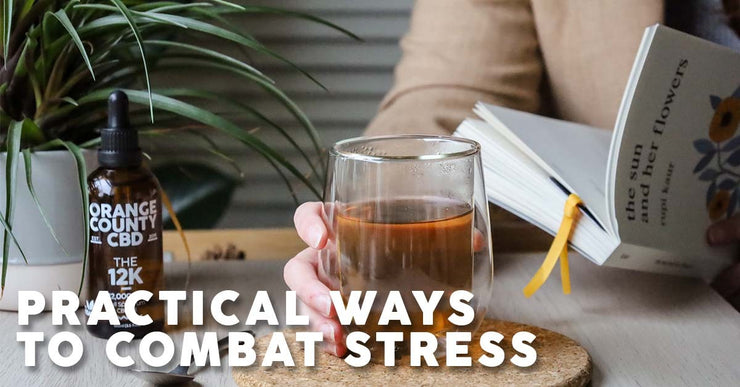10 practical ways to combat stress


Feeling stressed can be challenging to deal with, and in the long-term it, can have a profound effect on your health, both physically and mentally. Stress can be caused by a huge variety of different things and what one person finds very stressful, the next person might not, which can make it even more of a difficult thing to manage.
While having a totally stress-less life isn’t a realistic possibility for most people, there are steps that you can take to minimise the stress you feel and change your response to it, which can be very beneficial for your body and mind. We’ve compiled some tips for things you can do to combat stress.
Do something energetic
Exercising isn’t going to take away the cause of your stress, but physical activity is known to help manage stress and can help with ordering your thoughts and clearing your mind, which may help you deal with the issues causing the stress more calmly.
It can help stop negative thought processes, as your mind tends to focus on what the body is doing and feeling rather than what made you stressed. Being energetic might look different for different people.
It could be a gym workout, a run, cycle or a swim, or it could be something like dancing, a brisk walk or following an online exercise tutorial video.

Spend time with people
Spending time with friends or family can be a great antidote for stress all by itself, especially if they make you laugh and help take your mind off whatever is causing you to feel stressed.
In terms of helping you to deal with the problem or issue itself, talking things through with people you trust can also be a great help by giving you an outside perspective on things.
This can sometimes help you find a solution for the stressful issue or at least find an alternative way to try reacting to it.
Practice self-care
Whether the thing(s) you’re finding stressful are related to work or another situation, prioritising your own wellbeing can be a good way to counteract stress and its impact on you.
Take some time out to do things that you enjoy, whether that’s reading a book, taking a long bath, going to see a show or band, having a pamper session or taking a walk outside.

Take on a new challenge
Whether it’s starting a new hobby and developing skills as a result, learning a new language or a musical instrument, giving yourself a challenge to focus on can help build confidence and make you more resilient, which helps when dealing with stress, as well as providing a positive distraction if needed.
Volunteer for a charity or community group
Taking part in activity that helps other people can often help you find a different perspective on your own stress and its causes. It doesn’t take your problems away, but can help you become better equipped to deal with the situation and build resilience.
If time is an issue and you can’t volunteer for that reason, you can instead try doing some small random acts of kindness to help others, which can also be beneficial for your stress levels as well as making someone else’s day better.
Whether it’s paying for the person behind you in the fast food or coffee drive-thru, leaving positive notes on public transport for passengers to find, baking cakes for your workplace, picking up litter in your local park or buying flowers for someone, there is always something you can do regardless of your budget or the amount of free time you have (or don’t have).

Avoid negative habits
At times of stress, it can be really easy to rely on things that are bad for us as a way to make us feel better or cope, whether that’s something like alcohol, smoking, drinking excessive amounts of caffeine or eating lots of unhealthy foods.
If this carries on long-term, it can cause some serious health problems and doesn’t help resolve whatever is stressing you out in the first place. Instead, try to build positive habits like those mentioned in this blog to help you combat stress and deal with the cause(s).
Focus on the things you can control
Depending on the cause, or sometimes multiple causes, of your stress, resolving it might not be in your full control.
By trying to focus instead on the elements of the situation that you can control, including your responses to the stress, you can claim back some ownership of what is happening and let go of the things that you cannot change.
It’s easier said than done, but choosing to concentrate on your response to the situation rather than what is causing it can help you deal with the stress more positively.

Try meditation or visualisation
Finding some ‘mental quietness’ in the midst of stress can be difficult, but there are techniques that can help you with your focus.
Finding a quiet place to sit comfortably, close your eyes and breathe deeply and evenly for a few minutes is a good start.
Focusing on an object or word can help you centre yourself and feel much calmer.
Visualisation is similar to meditation but is a multi-sense experience that involves imagining yourself in a calm or peaceful location, which can reduce stress. It might be you visualising yourself on a beach, somewhere else in nature or a specific ‘happy place’ that you have experienced in real life.
Combining these techniques with scents like diffused essential oils can make it an even more calming experience that helps you feel better able to deal with your stress and its causes.
Hang out with a pet
Interacting with animals has been found to decrease levels of cortisol in people (which is a stress-related hormone), and most pet-owners will anecdotally tell you how their pets help them to relax and ease stress.
While pet ownership isn’t right for everyone, if you don’t have your own furry friend, you can perhaps visit a friend or family member with pets, or even volunteer at a local animal rescue charity to spend time with animals whilst also helping out practically.

Journal about or write down the things you’re finding stressful
For some people, simply the act of writing down the things that they are stressing about can be beneficial, as it gets thoughts out of the head and onto paper, which they sometimes find leaves them calmer automatically.
For others, writing about their stress and the causes can help provide a different perspective or give additional context which can help them see how they could respond differently and experience less stress as a result.
Stress can be very difficult to deal with and because we’re all different, not every practical idea for combatting it will work for everyone.
However, we hope that some of these tips can help you to build positive habits and tools to help better manage stress and try to tackle the causes when possible.
Sustainability